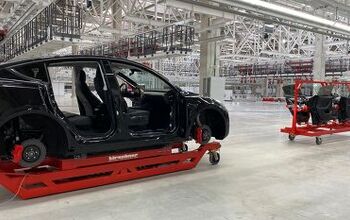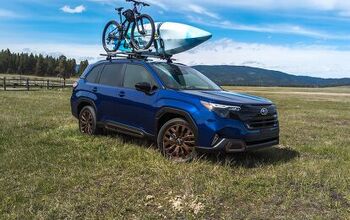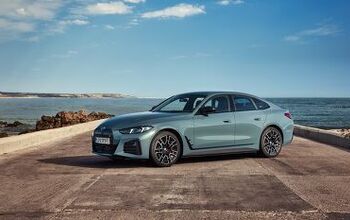Volkswagen Has a Low-priced EV Plan to Keep Rivals At Bay: Report

Volkswagen doesn’t want competitors unsurping its electric car efforts, so there’s a plan afoot to give buyers what they want at a much lower price, sources claim. Two reports, citing those with knowledge of a strategy not yet approved by the automaker’s supervisory board, state the company plans to go cheaper than its upcoming line of I.D.-badged EVs.
How cheap, you ask? How about $21,000?
That’s the price stated by Bloomberg in its late-Thursday report, with sources claiming the vehicle — a subcompact crossover — would enter production in 2020, likely at VW’s Emden, Germany assembly plant. Production would total 200,000 vehicles per year.
VW’s first MEB-platform electric vehicle, called the I.D. Neo (seen above), is also headed for a 2020 production start date, with the company claiming the hatchback will start around $26,000. Slotting a new, cheaper vehicle below that would help cover VW Group’s bases. While the report cites Tesla as a main competitor, the yet-undelivered base Model 3 carries a price of $35,000 in the U.S. and wouldn’t be any less costly in Europe. With this entry-level EV, VW would be guarding its back door against the likes of Renault and other affordable, mainstream automakers.
A report in Reuters states pretty much the same thing, with a source saying the new vehicle would cost less than 20,000 euros (or less than $22,836). All of this is designed to protect VW’s massive domestic workforce from dastardly, diesel-hating lawmakers and cunning automotive rivals. VW is expected to lay out the plan at a Nov. 16 strategy meeting.
With VW’s product horizon filling up with EVs, plant capacity becomes a problem. While the automaker still makes internal combustion cars and light trucks, not all of those models need to be produced in Germany. Production of VW’s Transporter van could make its way to a Ford plant in Turkey, a source claimed. Ah, the Ford connection rears its head again.
A slew of reports in recent days suggest the VW-Ford partnership could take a number of forms, and it’s not out of the question that VW would grant its American counterpart access to its MEB electric architecture. In addition to a light commercial vehicle pair-up, the German automaker also seems interested in the Ford Ranger platform.
[Image: Volkswagen]

More by Steph Willems
Latest Car Reviews
Read moreLatest Product Reviews
Read moreRecent Comments
- Lou_BC Well, I'd be impressed if this was in a ZR2. LOL
- Lou_BC This is my shocked face 😲 Hope formatting doesn't fook this up LOL
- Lou_BC Junior? Would that be a Beta Romeo?
- Lou_BC Gotta fix that formatting problem. What a pile of bullsh!t. Are longer posts costing TTAC money? FOOK
- Lou_BC 1.Honda: 6,334,825 vehicles potentially affected2.Ford: 6,152,6143.Kia America: 3,110,4474.Chrysler: 2,732,3985.General Motors: 2,021,0336.Nissan North America: 1,804,4437.Mercedes-Benz USA: 478,1738.Volkswagen Group of America: 453,7639.BMW of North America: 340,24910.Daimler Trucks North America: 261,959


































Comments
Join the conversation
EVs are a global mandate....Funny how in many of the efforts to boil this prospect down to the essentials invariably omit the only factors that really matter.... The EV problems presented are often made from a position of self-prescribed ignorance...a fatal partiality. These are targeted at daily commuters....an EVs range only limits the population of commuters for which the product is applicable. In fact, I would argue that an EV with a shorter range (smaller battery) has a place in the market...if your commute is only 20 miles each way it wouldn’t make sense to carry 200 extra miles worth of battery mass each way everyday...some people cannot grasp the simple foundation of what makes EVs benefitial... The ICE is not the benchmark...it’s the dinosaur.
My city car is a compact 1993 Renault Twingo. It is a cheap, disposable car that has gone through four owners but continues to serve me well. However, with the current CO2 hysteria here I may soon be forced to get rid of this reliable but ‘highly polluting’ (according to our hysterical virtue signaling politicians) car. An EV for the city would be wonderful, such as a Renault Zoe with a range of 180-316 km. The e-Golf or better yet the smaller but roomy e-Up! are also interesting EVs.